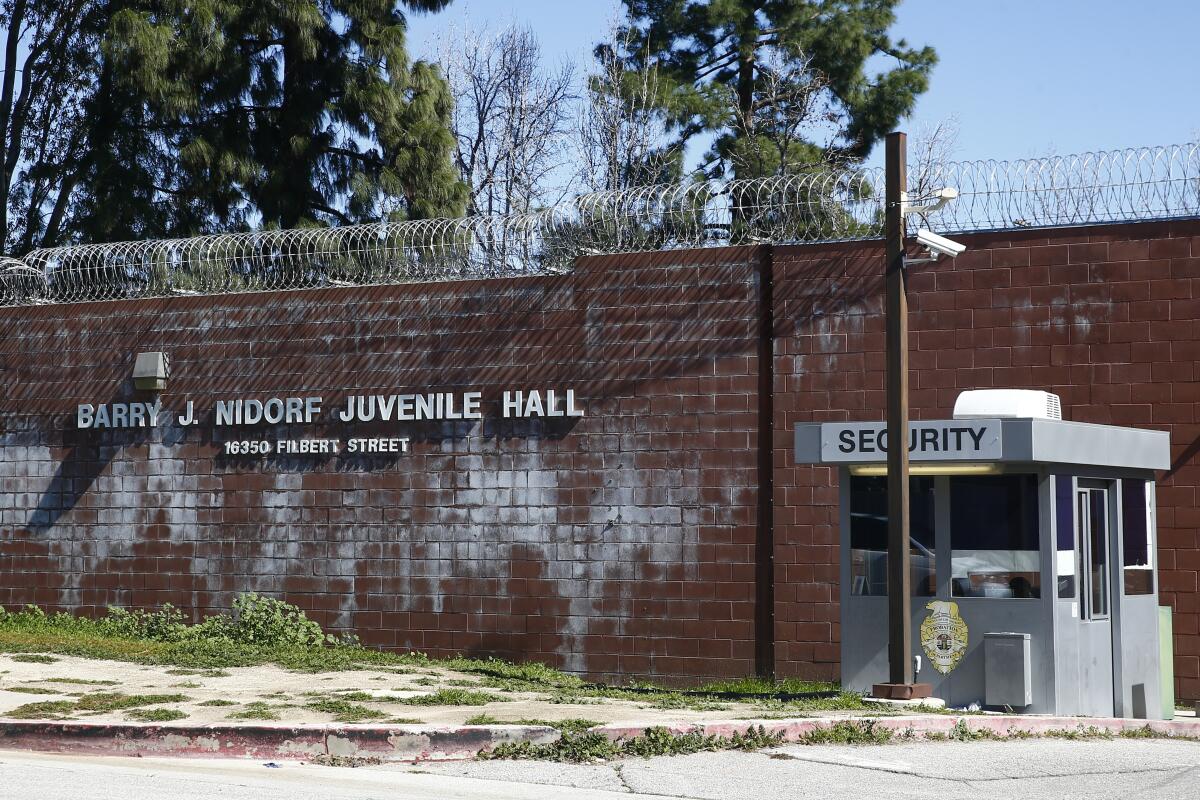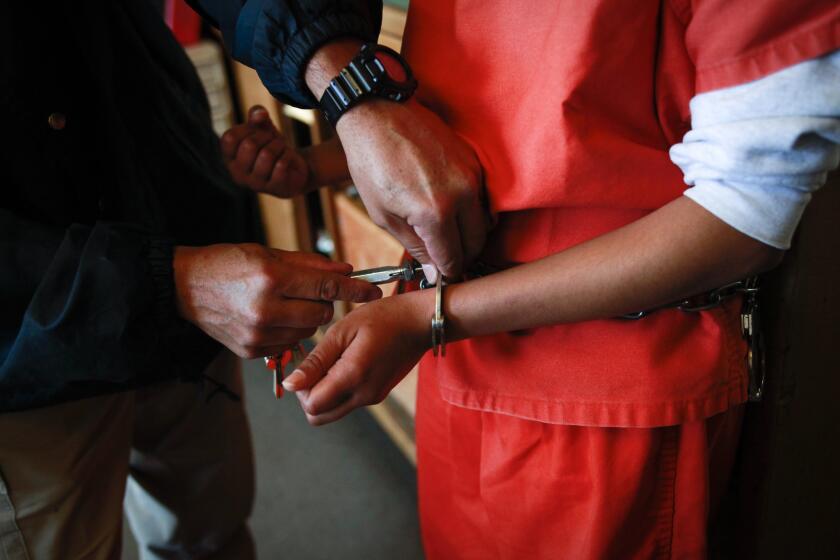L.A. County juvenile halls are ‘unsuitable for the confinement of youth,’ state board finds

- Share via
Both of Los Angeles County’s juvenile halls are unsuitable to house young people, a state agency that monitors such facilities has found.
The unanimous vote Thursday by the Board of State and Community Corrections gives the county 60 days to either remediate the violations or remove young people from the Barry J. Nidorf Juvenile Hall in Sylmar and Central Juvenile Hall in Boyle Heights.
In February, inspectors found that the juvenile detention centers, part of the largest youth justice system in the country, were out of compliance with state regulations. The county probation department subsequently addressed some of the issues.
But in a review earlier this month, board inspectors found that problems persisted, including failure to complete health assessments for newly admitted juveniles and insufficient documentation to determine whether the county had been justified in placing youths in solitary confinement.
This marks the first time that the independent oversight body, created in 2012, has found any California juvenile hall to be unsuitable.
The two facilities, the only juvenile halls in L.A. County, are operating under a settlement agreement with the state attorney general’s office, which found that juveniles living there were mistreated and dehumanized. The agreement lays out a four-year plan to reduce the use of force against juveniles, to create a more homelike setting and to boost educational and mental health services.
A census in June found that the juvenile halls hold an average of 254 young people a day, almost all of whom are Latino or Black, behind high fences and razor wire.
Of the 71 documented uses of force in the two juvenile halls in June, 11 involved pepper spray, according to county data. A 2018 investigation by the county inspector general found that use of pepper spray to subdue juveniles in the custody of the county was “inappropriate and avoidable.”
The detention officer’s email described “chaos” inside one of Los Angeles County’s juvenile halls.
The clock to address the issues highlighted by the corrections board will start once the county receives official written notice, which should occur by Oct. 1.
“This is serious, and they know it’s serious, and we are hopeful that they are able to accomplish complete compliance prior to the 60 days,” Linda Penner, chair of the Board of State and Community Corrections, said in a statement.
L.A. County Chief Probation Officer Adolfo Gonzales was unavailable for an interview Friday.
The county Probation Department said in a statement that it has been working to address the issues and will be in full compliance by the deadline.
“Probation is committed to ensuring that both juvenile halls are in compliance, and significant strides are being made to transform our facilities into more homelike environments,” the statement read.
L.A. County Supervisor Sheila Kuehl said in a statement that the oversight board’s move was “unusual” and that the county must act quickly.
“This action is a signal to L.A. County Probation that these irregularities need to be addressed,” Kuehl said.
Supervisor Hilda Solis said she has asked both the Probation Oversight Commission, a civilian board created by the supervisors in 2020, and the county’s Office of Inspector General to provide “much-needed accountability on resolving these critical issues to ensure the utmost care for youth.”
“The issues raised by the Board of State and Community Corrections are long-standing and, frankly, should have been resolved long before the BSCC conducted their audit,” said Solis, who chairs the Board of Supervisors, in a statement.
Dominique Nong, director of youth justice policy at the California division of the Children’s Defense Fund, criticized the state board for not holding the county accountable sooner.
“This is one more compelling piece of evidence that L.A. County, and specifically L.A. County Probation, are failing our young people and are failing in their duties to protect not only our young people but the staff as well,” she said. “This is long overdue both for L.A. County and the BSCC agency.”
In response to that criticism, Aaron Maguire, general counsel for the BSCC, said this was the first inspection cycle for L.A. County under updated regulations for juvenile detention facilities that increased protections for youths.
Last November, the supervisors moved to dismantle the county’s youth justice system in favor of a “care-first” model that would look less like prison and would emphasize emotional support, counseling and treatment.
After years of incremental reform, Los Angeles County is moving to dismantle the largest youth justice system in the country in favor of a “care-first” model to better serve young people in custody.
The probation department’s juvenile division is set to be replaced with the newly created Department of Youth Development, in a transition that will take at least five years.
Patricia Soung, an independent consultant on juvenile justice, said the state board’s decision was a referendum on the county Probation Department’s ability to care for the youths it houses and is supposed to be rehabilitating.
She pointed to the board’s finding that the centers were placing youths in solitary confinement without adequately documenting the reasons. The board, she said, was telling county officials, “Time’s up.”
Times staff writer Matt Stiles contributed to this report.
More to Read
Sign up for Essential California
The most important California stories and recommendations in your inbox every morning.
You may occasionally receive promotional content from the Los Angeles Times.













